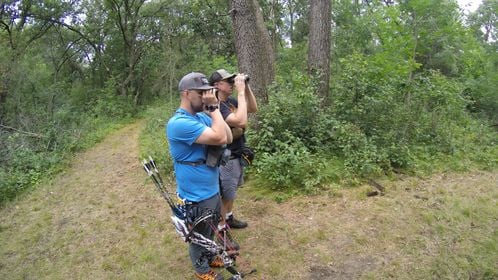Giving & Taking Archery Advice
There is a great deal of advice already available in print and on video that will take us a long way toward becoming better shooters. Still, there is nothing like having a trusted advisor standing next to us on the range explaining what comes next.
ADVOCACY & EDUCATION


There is nothing like the advice of a teacher to move a shooter along to the skill level where the shooter wants to be and there is nothing like the enthusiasm of a shooter to seek out a teacher that has the right advice. In archery it is not always possible to find the one teacher that can guide us along, it just seems like there is not enough of them, and/or, we just are not prepared to meet with them on their terms.
Fortunately, we do have in our midst a community of accomplished archers who have attained a level of skill and proficiency that enables them to advise the rest of us on how to go about addressing the finer details of shooting a bow and arrow. The trick is to get this advice, test it for soundness, and put it to good use.
There is a great deal of advice already available in print and on video that will take us a long way toward becoming better shooters. Still, there is nothing like having a trusted advisor standing next to us on the range explaining what comes next.
Notice that I said, "trusted"? Before all things it is important to understand the motivations of the person that is giving advice. My personal feeling is that most people can be trusted with wanting to sincerely help, but not all can be expected to give advice on the finer details of shooting a bow despite their willingness to do so.
We get a lot of information by way of casual contact, and some of its good and some of its bad - we have to consider what we hear in this context very carefully. Without carefully filtering what our sister's boyfriend just told us we can easily end up wasting valuable training time and money.
We are fortunate in our archery community in that most of us know at least one person who has worked things out and has done a lot of the legwork involved in becoming a better archer. It is this person that we need to approach and ask pointedly to help us out - we, as aspiring archers, need to step up and ask that person to give some advice on how to move things along.
At this point something needs to be said to those folks who are leading the way skill wise - be prepared to answer questions and be prepared to help! Understand that it is an honor to be asked and a privilege to get another shooter heading in the right direction. There is a ton of responsibility when you are the person who has worked it out and has elevated your game to a high level. Not only are you expected to do well shooting-wise but also it is understood that you are the local expert.
Let's talk about how to give advice:
Do not give advice if you are not prepared to take the idea you are presenting to its logical conclusion - do not explain back tension and then walk away without walking the shooter through it. If time does not allow a complete explanation say this, and if you are willing to volunteer a time when things can be completely gone over do so.
Avoid making casual remarks without your making sure that they are clearly understood. What is apparent to you simply will not always be to other people, and your casual presentation of an important element without clarification will most likely cause confusion - no matter how simple the idea.
Try to stick with the presentation of one element or idea at a time – until the shooter has that element understood. Make sure that the person that you are helping has the idea ingrained before you move onto another. This might involve your speaking on a single idea for an extended length of time - meaning that this week it might be back tension and next week it might be feet placement (or maybe back tension AGAIN!). Be prepared to stay with the theme despite the other flaws in a shooters’ game you might see and naturally want to fix.
Understand the seriousness when you are asked a question. For many people it is tough to ask the top gun just how he/she is doing it. Realize that the person asking the question is not only asking for help but is also expressing a willingness to try whatever it is that you are about to propose they do - this is an important responsibility and should not be taken lightly.
Recognize when an archer genuinely wants advice or simply wants sympathy. Just because an individual is shooting poorly and is frustrated by it does not mean that it is time to step in and give advice, despite the poor performer looking towards you. During times like these it is best to just give some encouragement and not ask pointed questions about form or attitude unless asked.
Talk a little, demonstrate, and then let the person that you are trying to help try it out. Do not weigh things down by talk, talk, talk, get your idea across and get onto trying it out as quickly as possible. This will keep the interest high and will keep things moving along.
If your advising in a formal setting – teacher and student, it is a fair expectation of yours that the student will have taken what was taught during the last session, practiced it, and is able to demonstrate it. If a student is continually coming to a session not prepared it is time for both of you to move on.
Most importantly, think before you speak.
For those who want to improve and need advice:
Think about what is that you really want to know, and if you know nothing then ask where it is that you need to begin. Most archers have some elements worked out but not all. Think about the phrasing of your questions and make sure that you are clear with what it is that you are asking.
Do not let your first instinct be to take casual advice seriously. The advice that you just happen to overhear or hear from shooters with no more experience than yourself should be taken with a grain of salt, and certainly not acted on until you have put it past someone who actually knows.
Find one person and work with them on the elements. Avoid advice by committee, and try to get into a situation where you can meet with an individual and work through the ideas that they are presenting - in other words have one teacher at a time and let them take you as far along as they are able.
Give your advisor some slack and understand that they are human just like you. If there is something that they have said that you do not understand keep asking until it is clear to you. The keep asking part is your responsibility because your advisor will shut up and let you shoot if he/she thinks that you have got the idea.
Be prepared to pay for advice. There is nothing wrong with an elite archer charging you for the knowledge that they have worked very hard to attain. If you are in this situation and have a dedicated accredited teacher count yourself lucky and make the most of it. What to look for in this situation is a formalized training structure where you are meeting regularly with the teacher and you are getting individual instruction over a predetermined time frame.
Be prepared to relearn and to make adjustments to what you already think you know. You may think that you have an element perfected when in fact you are wrong. Be prepared to change and be prepared to feel awkward as you make the change. It will take time for an element to become ingrained before it will feel natural and will be naturally repeatable.
Most importantly, listen!
Get some good advice and good shooting!
